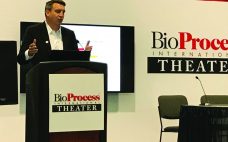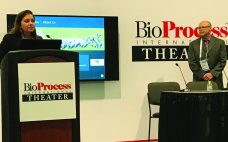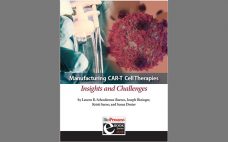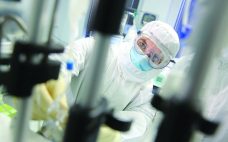Moderator Dan Stanton, with Weichang Zhou, Jenifer Wheat, Roger Lias, and Jim Vogel Single-use technologies (SUTs) are now prevalent within bioprocessing, but does this spell the end of industry’s historic reliance on stainless steel and fixed facilities? This roundtable was formed to discuss the wealth of investment in single-use (SU) equipment and flexible manufacturing solutions by contract development and manufacturing organizations (CDMOs) over the past few years, pitting that against what looks like a resurgence in fixed-cost stainless steel plants…
Manufacturing
Emerging Technologies and Strategies to Accelerate Process Development and Time to Market
Gustavo Mahler, president and chief executive officer, AGC Biologics AGC Biologics is one of the largest global biologics contract development and manufacturing organizations (CDMO) specializing in clinical and commercial development of therapeutic proteins. It has developed more than 200 products, both mammalian and microbial, from preclinical to commercial on all scales. The company’s CGMP facilities are located in the United States, Europe, and Japan. AGC Biologics’s technologies and strategies to accelerate time to market include standardized cell-line and cell-bank creation…
Future-Proofing and Understanding Your Molecule with Contemporary Analytics and Formulation Approaches
Greg Adams, senior director of global analytical strategy and development, Fujifilm Diosynth Biotechnologies (FDB) “Proteins have personalities.” Adams began. Their three-dimensional structures and folding patterns influence how each protein will behave. Analytical methods that evaluate a protein’s quality attributes need to be reproducible and robust. Proteins are evaluated through elucidating their amino acid sequences, using molecular informatics and modeling, characterizing three-dimensional structures, and understanding the degree of posttranslational modifications. The resulting knowledge will help you ensure consistency and safeguard methods.…
Bringing Biologic Products to Market Faster By Partnering with a Single Services Provider from Development Through Commercial Supply
Andrew Sandford, vice president of business development, Catalent Biologics Catalent feels strongly about “Patients First.” The core of the company’s mission is to “enhance and improve the lives of your patients.” Bringing a new drug to market is expensive, costing about US$2.6 billion per drug. It takes an average of 12 years from drug discovery to final approval, with only 1 in 5,000 products ultimately approved by the Food and Drug Administration. The expense, risk, and long timelines of drug…
Product Development Through Commercial Production: Guiding Your Biologic from Start to Finish
Eunyoung Yang, team leader and chief development officer of the business development team, Samsung BioLogics Samsung is maximizing customer satisfaction by providing customized, cost-effective, and comprehensive development and manufacturing services. It is the number-four company in the world worth, US$92.3 billion, with 672 offices in 91 countries and employing 512,000 people. Samsung provides electronics (its most well-known business), engineering and construction for heavy industries, financial services, and healthcare support including biologics manufacturing, a medical center, and electronic medical devices. Samsung…
CMO Fusion: Where Stainless Steel Meets Disposable Technology
Molly McGlaughlin, director of strategy and business development, BioVectra Jim Stout, director of process science, BioVectra  McGlaughlin introduced BioVectra. The company has been in business for 45 years and is based in Canada. Its a well-established contract development and manufacturing organization (CDMO) and fine-chemical manufacturer, and is a subsidiary of Mallinckrodt Pharmaceuticals. BioVectra started out as diagnostic reagent company and now has a complementary set of niche capabilities. From 10 years of fermentation experience, it was a logical progression to…
eBook: Manufacturing CAR-T Cell Therapies — Insights and Challenges
The rapid evolution and clinical success of T-cell immunotherapies is an exciting advance in the war on cancer. This treatment modality uses engineered cells from a patient’s own immune system to target and destroy cancerous cells. Chimeric antigen receptor T-cell (CAR-T) therapy is emerging as the most studied treatment in T-cell immunotherapy and is the basis for many ongoing clinical trials. FDA approval of the first two CAR-T therapies in 2017 provides a regulatory development framework, but optimization of CAR-T…
Accelerating Intensified Bioprocesses with High-Throughput Small-Scale Tools
While many biopharmaceutical companies are exploring paths toward continuous processing, many tools already exist for implementing process intensification. As the authors of this special report illustrate, hybrid continuous processes that benefit from single-use technologies along with continuing improvements in perfusion cell culture already now are enabling improvements in cost reduction and accelerating time to market. And novel high-throughput and automated small-scale systems are helping development scientists gather more information in less time than before, reduce their development footprints, and make…
Oxygen Mass Transfer Correlation for a Rocking-Motion Bioreactor System
Disposable bioreactor systems are technologies commonly used in bioprocessing. They provide cost-effective contamination control and allow more flexible facility layouts than do stainless steel alternatives. One of the most popular types of single-use bioreactors uses a rocking platform in place of a traditional shaft and agitator assembly to aerate and mix cell culture material within a presterilized, single-use plastic bag (1). The system studied here is the ReadyToProcess WAVE 25 bioreactor (GE Healthcare Life Sciences). In contrast to conventional stirred…
Demonstrating Scalable T-Cell Expansion in Stirred-Tank Bioreactors
Emerging cell therapies have excited the pharmaceutical industry because they indicate potential new pathways to treat some of the most life-threatening diseases. T-cell therapies currently are the flagship technology in cell therapy with recent US FDA approvals of Novartis’ Kymriah (tisagenlecleucel) and Gilead’s Yescarta (axicabtagene ciloleucel) treatments. Those therapies and others still in development use peripheral blood isolated lymphocytes (PBLs) modified with chimeric antigen receptors (CARs) or modified T-cell receptors (TCRs) to trigger the innate cytotoxic response of these immune…










